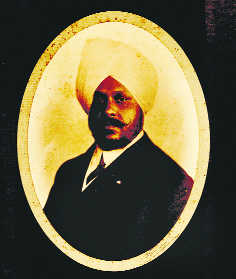
Raja Sir Daljit Singh
Shailaja Khanna
Astonishingly, one of Shimla’s most eminent residents of yesteryear was felicitated in far-away Delhi last week by Pune-based vocalist Manjusha Patil. She sang a composition of the musician-scholar Prince at the Indira Gandhi National Centre for the Arts (IGNCA), in a special programme focusing on compositions dedicated to Shri Krishna.
One was reminded of this unusual “adopted” Son of Shimla, Raja Sir Daljit Singh. (Adopted because though he was born in Kapurthala, he loved Shimla and died there) He was indeed an amazing man – born in 1878 in Kapurthala, grandson of Maharaja Nihal Singh, the Prince spent the latter part of his life in Shimla, from 1910s to his death in 1947. He loved Shimla, and after staying a few years in properties, including Jammu Castle in Kasumti, acquired a huge estate in Chotta Shimla, Strawberry Hill.
Blessed with a powerful intellect, and of a scholarly bent of mind, he schooled at Aitchison Chief’s college in Lahore. Then, the aristocratic students used to live with their own retinue of servants; there were no dormitories. A distinguished classmate was King Thibaw of Burma.
The Raja studied philosophy and the scriptures and wrote several books on Sikhism, in English, including on Guru Nanak’s life and teachings, and on Guru Tegh Bahadur’s hymns. Surprisingly, he also wrote in “Braj bhasha”, on Shri Krishna, published in “Tri Dhara” and in the Krishna Ank, in the Gita Press Gorakhpur. Another unusual work was the teachings of the Bhagwad Gita in his native Gurmukhi.
He was also an active Theosophist for a few years, and during this period, was one of a select group headed by Dr Annie Besant who founded the Central Hindu College (CHC) in Banaras, which years later was enlarged to become the Banaras Hindu University by Pt Madan Mohan Malviya.
However, mysticism was not the only area in which the Raja excelled. He was also a wonderful musician, a rudra veena player; disciple of Ustad Mir Kallan, and his younger brother, Ustad Mir Rehmat Ali, direct descendants of Tansen from his daughter’s line. The Ustads lived with him, and did not perform in public, as they did not consider themselves as “mirasis” or professional musicians. Their father was in the Mughal Court of Bahadur Shah Zafar, and after the British deposed their monarch, they lived in Kapurthala with their patron, Raja Sir Daljit Singh’s father, Kr Bikrama Singh. Despite being an aristocrat, he used to do riyaaz (practice) every morning from 4 am to 8 am for many years. He composed several very intricate gats (compositions) which are played even today. His home in Shimla was always open to musicians and private concerts.
Despite not being inclined to public life, the death of his elder brother forced him into it. Subsequently, he accepted a nomination as the only Indian member at the time of the Secretary of State’s Council, and lived in London for a brief time, during this period. A crisis in Kashmir, resulted in his being sent there as Prime Minister for a short period as well. Thereafter the sudden untimely death of his elder son drove him into a life of seclusion, where he once again retreated into his favourite pursuits of scholarship and music.
Of a saintly bent of mind, the Raja abstained from alcohol and was also a vegetarian for the larger part of his life. He had a very subtle wry sense of humour and for light relief, occasionally used to correspond with his like-minded friends in comic verse. Indeed, a great man.
(The author writes on music, musicians and matters related to music)



























